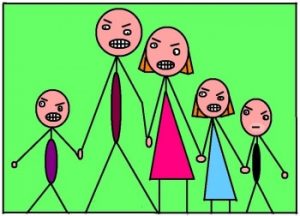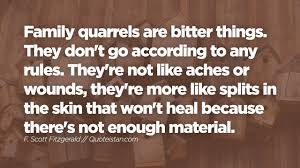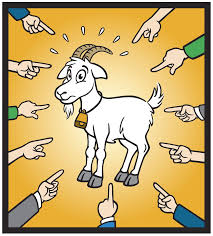
All dysfunctional families have one or two disturbed parent(s) who “run the show”, this can be one parent or a power struggle between the parents (including step parents), each jostling to take control and therefore escalating the level of psychosis within the family unit.
The struggle for power happens between parents in the same way that it does whenever a narcissist is trying to dominate by
- Name calling
- Lying
- Triangulation
- Verbal abuse
- Lack of respect for boundaries
- Invalidation of emotions
- Neglect
These parents between them will allocate specific roles for each child within the family. So, a daughter might be “daddy’s girl” and as a result despised and envied by her mother, the mother’s golden male child might be the father’s scapegoat and so forth. Each role is accepted and reinforced by each and every member of the family. The most destructive role given within any dysfunctional family is that of the scapegoat (and there can be two scapegoats with in the same family) one for each parent. The scapegoat is seen as not really being part of the core family, but rather someone who is forced to take on all of the pain and anger within the family and narcissists are very good at redirecting anger, especially to the more vulnerable and sensitive children.
The siblings that have been selected as part of the core family will openly be given permission to treat the scapegoat child(ren) any way that they want. This includes merciless bullying, stealing or destroying possessions, sneering, name calling and in general being physically and emotionally violent. In fact, the parents can often actively encourage bullying because:
- It means that they can divide and conquer their children if they are living in fear.
- They feed off others emotions even if it is negative.
- The bullied child will deal with the immediate dangers of being bullied rather than look at the dysfunction of the family unit
- A bullied and scared child is much easier to control than a confident secure one.
Offspring of narcissistic parents are not valued\validated or respected by their parents, so they are delighted to have children who they can bully, control and feel empowered by the role that being a parent offers.
If you come from a dysfunctional family it can literally take years to realise that the way you were treated was abusive and the only reason it felt normal was because they were all behaving in the same way – it couldn’t possibly be that they are all wrong and that you are right, could it? The scapegoat gets the most overt abuse, but everyone in a dysfunctional family is abused.
Over time and as the children get older the behaviour changes, although the underlying dynamic remains the same. “Accepted” children will stop pulling your hair and breaking your toys but will generally move towards verbal, emotional and even financial abuse (if they can get away with it). Verbal abuse will be reinforced/supported by the parents to ensure that that child does not move out of their designated role. By the time that the children reach adulthood their behaviours and habits have been so well policed and practiced they will feel absolutely normal. It will feel absolutely normal to disrespect others, sneer or attack their reputation. Not just within the family unit, but of anyone who feels like the slightest threat. Similarly, it will feel absolutely “normal” to move into abusive adult relationships where the disrespect continues. Children from dysfunctional families will have very poor boundaries and therefore it is difficult to know what is acceptable behaviour and what is not.
Over and over again the child will be told who “we” are and who they are. So “we” do not like certain types of people or things, “we” dismiss anyone who does not comply with “our” family narrative. So much so, that the child/adult child completely loses sight of who they are and what they want in life. Paradoxically, this is especially true of the children who have been designated more privileged roles. They see themselves as superior, more than a little special and definitely entitled. As a result of this they identify very strongly with the projected image of the family rather than develop their own identity, this can leave them floundering whenever they are outside their comfort zone, whenever they are in a situation where they have to compete as they feel that they should be given what they want just by showing up. Very few privileged people see privilege as a gift, they see it as their right, they are constantly conditioned to think that all that they have been given is their due. This can cause them to behave in a heartless way such as sending their once over indulgent but now aging parents to nursing homes because they are in the way/annoying or too much trouble/physically unattractive.
Dysfunctional families will often recommend that one member should go into therapy (because they are unstable and crazy) and then immediately discredit the therapist as an idiot if they say something that the family doesn’t like. The child that the family recommend go to therapy is often the one who needs it least. Any child who even vaguely attempts to criticise the family’s perfect image, will be met with aggression and utter contempt and an attempt (or several attempts) will be made to discredit the alternative to the family narrative and to pull the wayward family member “back into line”.
The process of recognising such family dysfunction is slow arduous and painful, most of us shy away from it for years because the reality of the situation is too painful and because we have been trained since infancy to protect the reputation of our family image at all cost.
All of the accepted family members will happily isolate, keep secrets from, belittle, sneer at and ostracise the ones who they deem “not to be one of us”, the dysfunctional parent will actively encourage this demonization so that the remaining family members will know what will happen to them if they dare to step out of line and therefore will enforce the absolute authority of the parent(s). This treatment of the ostracised family member will continue even after the child has become an adult. They will be blamed for everything that goes wrong in the family, be subjected to relentless smear campaigns to the extent that that family member will feel like they are the crazy one. It is like a laser treatment it can have as many channels of attack as there are family members and includes members of the extended family too.
The family members who wake up to the dysfunctional dynamic of their family will often have to work for years to gain self-esteem and confidence as they have been brain washed into thinking that they are worthless. Brainwashing does not have to be clever it is simply the constant repetition of the same message by someone you thought that you could trust. Your parents/family. The general overall message is “you are worthless I need you”, “I have all the power, but you must take all the responsibility” (even though you are a very young child).





